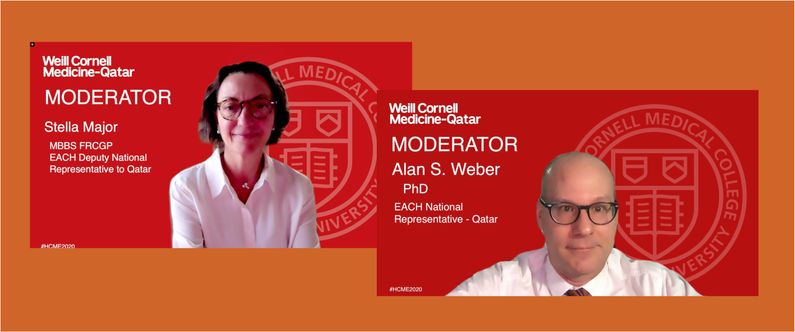WCM-Q conference highlights crucial role of communication in healthcare

The impact of effective communication strategies on healthcare outcomes was explored by delegates from across the MENA region, Europe and the US at a virtual conference hosted by Weil Cornell Medicine-Qatar (WCM-Q).
The Healthcare Communications in the Middle East conference brought together leading regional and international experts to share best practices, examine recent research, and discuss communication policies and standards in the healthcare systems of different countries.
The two-day event featured presentations, discussion sessions and four practical workshops on a wide range of issues, including the role of cultural competence training, current healthcare communications teaching strategies in Arabic-speaking countries, best practices for breaking bad news to patients and relatives, the impact of social media on healthcare communications, and health literacy in the MENA region. The course was co-directed by Dr. Alan Weber, Professor of English and Dr. Stella Major, Associate Professor of Family Medicine in Clinical Medicine and Director of the Clinical Skills and Simulation Lab. Around 600 participants joined the conference, which also featured patient and student panel discussions about the role of communication in healthcare.
Dr. Major, who was recently elected Qatar Deputy National Representative for the International Association for Communication in Healthcare (EACH), said: “Healthcare communication has emerged as an extremely important area of study in the MENA region, driven by the extraordinary pace of modernization of healthcare systems here and the highly diverse, multicultural populations of the region.”
The International Association for Communication in Healthcare (EACH) and its US-affiliated organization, the Academy of Communication in Healthcare, are the two largest healthcare communications professional organizations in world.
Dr. Major also said that she strongly values the key take away messages which the patient panel and the student panel presentations offered. The students drew upon their observations and remarked that health literacy gaps pose a bigger challenge than language barriers between patients and health care providers, affirming the importance of investing mindfully in promoting health literacy for all. The guest patients reflected on their diverse experiences as patients living with chronic disease and provided a reminder to healthcare professionals to never dismiss talking about emotions when they address their patients. Furthermore, stressing their belief in the phrase “health as wealth”, the guest patients reiterated the notion that patients and providers must work together to achieve optimal patient-centered care.
The first of the four workshops focused on breaking bad news and was delivered by Dr. Ambika Anand and Dr. Sheyma Al-Romaihi, both of Hamad Medical Corporation (HMC), and Dr. Tripiti Sinha of Sidra Medicine. Workshop 2 provided discussion and training in cultural competency in healthcare contexts and was delivered by Ms. Maha Elnashar, Director of the Center for Cultural Competence in Healthcare, and Ms. Huda Abdelrahim, Senior Specialist in Cultural Competence and Medical Interpretation, both of WCM-Q. Strategies for teaching and learning communication skills in Arabic-speaking countries were explained in the third workshop, which was presented by Dr. Katherine Miles and Dr. Aiman Al Sharei, both of the Hashemite University in Jordan, with Dr. Abdul-Salam S. Sultan of the National Training and Human Development Center in the Ministry of Health in Iraq, who also gave the keynote speech at the event. The fourth and final workshop was delivered by Dr. Marta Fadda of the Università della Svizzera italiana in Lugano, Switzerland and Past President of EACH, discussed ways to conceptualize, measure and promote health literacy in the MENA region.
Dr. Weber, who serves as the Qatar National Representative for EACH, said: “The success of this conference demonstrates that healthcare professionals and educators all over the MENA region are taking an extremely proactive approach to healthcare communications as a discipline. Moreover, there is a growing understanding that communication skills can and should be taught to healthcare professionals in a systematic way and that this can be a very powerful tool for optimizing patient outcomes.”
The event was accredited locally by the Department of Healthcare Professions (DHP) and internationally by the Accreditation Council for Continuing Medical Education (ACCME).